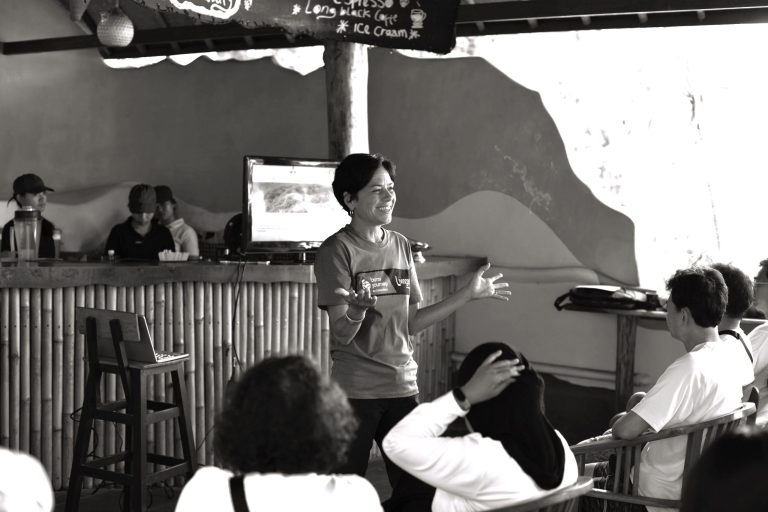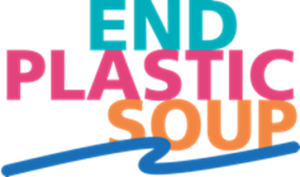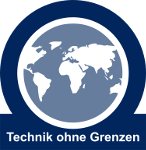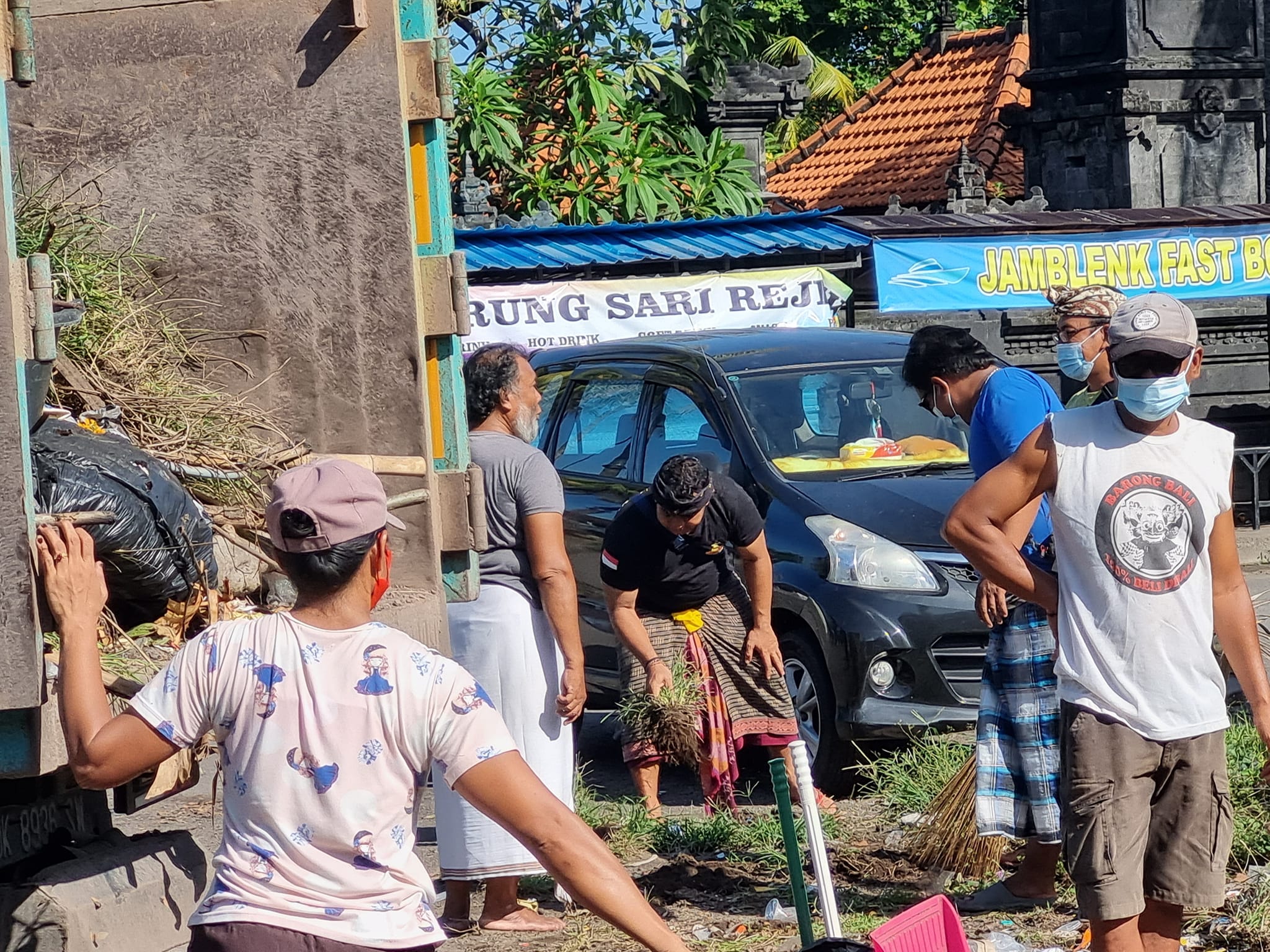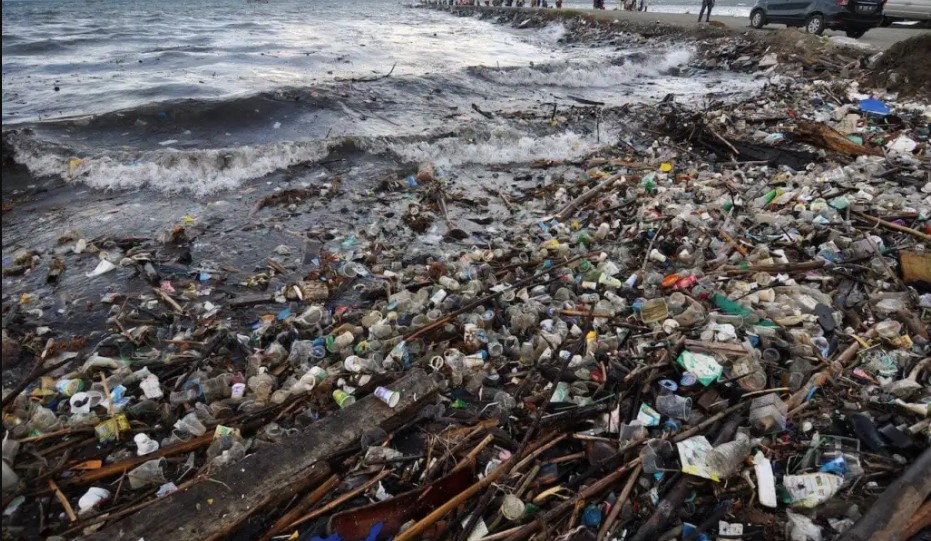
Waste Management
“A clean environment is a human right.”
Dalai Lama
Every minute, an entire truckload of waste ends up in the sea in Bali, via rivers, ships and indiscriminate dumping.
Indonesia produces an estimated 7.8 million tons of plastic waste per year, making it one of the largest producers of plastic waste in the world. According to official estimates, only around 10% of plastic waste is recycled. There are only 1,300 recycling stations in the country that can properly recycle plastic – and not a single one of them is in Bali!
Waste is still dumped at any available place, sorted in small waste stations and burned in highly polluting ovens or in people’s own backyards.
How we tackle the problem
In our waste management project for Padang Bai, we are working with international partners such as Rotary Germany, EndPlasticSoup and Technicians Without Boarders to develop a sustainable waste management system.
We work on 3 levels
Our concept & Our goal
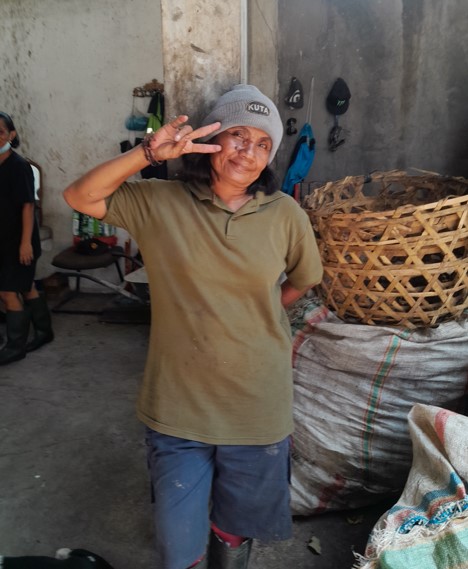
One of the first steps in introducing sustainable waste management is to set up a collection system. By collecting waste before it can accumulate, every household and business can dispose of its waste quickly and effectively so that it does not have to be dumped randomly elsewhere.
The newly established waste service collects waste at central hubs. Households are encouraged to pre-sort as much as possible into plastic, cardboard, metal and residual waste.
As a result, all public waste dumps in the village have disappeared.
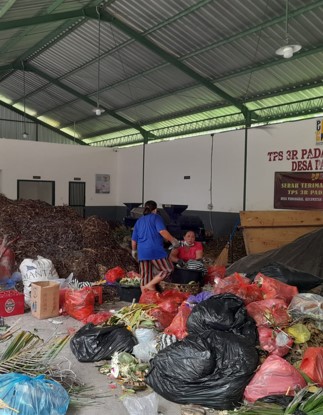
Expansion of the local waste collection center TPS into a functional basis for waste logistics. Construction of separate sorting areas for the waste brought in for better further processing on site, including a plastic waste washing plant for later recycling.
A powerful, newly built incinerator plant processes the residual waste. The use of high incineration temperatures reduces pollutant emissions, which is better for people and the environment.
Construction of a composting plant for organic dry waste for the production and sale of natural compost.
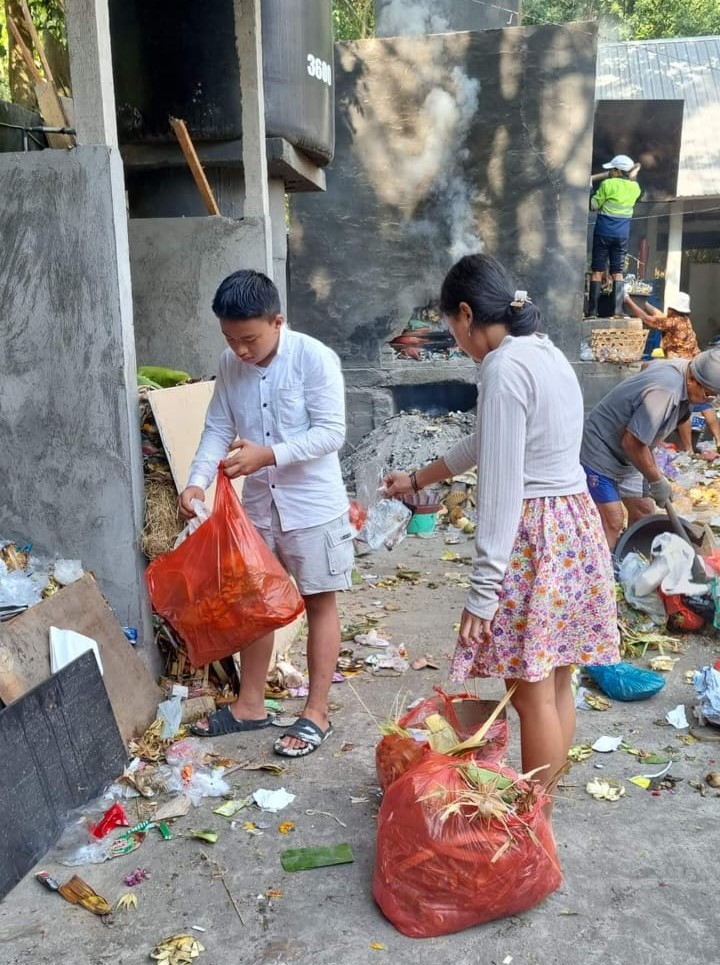
The mayor and her staff hold personal discussions with households and community representatives to explain the need for pre-sorting waste.
Posters and billboards in the village replace public waste containers. Video cameras also monitor illegally disposed waste.
Events in schools give younger children an idea of why waste is a problem and what they can do about it.
We provide answers
Frequently asked questions about the waste problem in Bali
Why does Bali have such a big waste problem?
A closer look at most of the beaches, riverbeds and forest areas shows: Bali has a garbage problem, and a massive one at that. Especially in the rainy season, waste from rivers is washed into the ocean and ends up on the coast by the ton.
But why is this the case? And where does all this garbage come from? Why does it end up in the ocean or in nature on land?
First important info, most of the garbage that is found here on the beaches of Bali does not come exclusively from Bali. It is washed up by ocean currents. This is a situation that is difficult to get out of here. According to the UN, Indonesia is the second largest plastic polluter in the world after China. ‘The country produces 3.2 million tonnes of uncontrolled plastic waste every year, of which around 1.29 million tonnes end up in the sea’, according to a 2020 report by the United Nations Environment Programme. With a population of more than 274 million, Indonesia is the fourth largest country in the world and the world’s largest island nation.
And it is precisely in this situation that there is a lack of a comprehensive waste management system! In many places, waste is dumped in rivers, green spaces and at the side of the road or simply burnt due to a lack of alternatives. There is no fully developed waste separation and recycling system.
Another major problem is the everyday habits of the locals. The majority of people buy their food and drinks from street stalls. Disposable plastic is not only useful for this, but to date has also been the only cost-effective option for smaller vendors. Plastic and plastic packaging are seen as modern. Who wants to buy their food in a banana leaf? It is now ‘chic’ to buy everything ‘to-go’. This is also the example set by Western civilisation. And ultimately, the Bali tourist also needs his hygiene standards: polystyrene packaging…
From hair shampoo and coffee to ketchup, everything here is packaged in small plastic containers for daily use. You do the maths! It’s cheaper than a whole bottle! But unfortunately there’s less in it…
There is still a long way to go. And without far-reaching political decisions regarding a ban on at least single-use plastic, nothing will change here any time soon. And that’s exactly why we got involved. To at least do something about waste here – in a small village in East Bali – and to make people aware of the situation.
What exactly happens to the sorted waste
Waste is currently sorted into the following categories: Plastic, cardboard and paper, metal, glass, organic dry waste, residual waste and hazardous materials.
The sorted materials are packaged and sold to various dealers. Recyclable plastic is sent to recycling companies on the neighboring island of Java. Cardboard, metal and glass are sold and reused locally here in Bali. The organic dry waste is processed directly into natural compost at the local waste station and sold. What remains is residual waste and hazardous materials. Hazardous substances are collected by the local district government and disposed of centrally.
Weak point: so far we have no further information about this. A to-do on our side. The remaining residual waste is still incinerated at the waste station. One reason why our efforts are aimed precisely at reducing the amount of this residual waste to a minimum! With the high-performance incinerator built by Technology without Borders, we will be able to incinerate this waste safely and without leaving any residue. Because the landfills in Bali are full…this alternative is not an option.
What are the benefits of a waste management project in a small village?
Most people will say not much. But is that really the case? Why not start small, show that it can actually work if you work together with the local population and not act as the sole doer!
If we manage, with the help of village leaders, to raise awareness about waste, get households AND small businesses to manage their waste responsibly to make the small village more attractive again to visitors from all over the world who also see the efforts of the locals, everyone benefits! If we as a small East Balinese village can show that it works, if everyone can work together and create an understanding of the need to deal with waste responsibly, then we can be an example for other villages. And that is exactly where we want to go.
Beach Clean Ups – a solution
Of course, beach and ocean clean ups are a solution! But unfortunately not a sustainable one. Given the waste situation described above, it is not enough to simply collect the waste. We have to get to the root of the problem as far as possible. To prevent more and more waste from polluting the beaches and the ocean. It is easy to collect garbage underwater and we actually do this on every dive. We also take part in beach clean ups, which take place here regularly and also involve school classes, villagers and government officials. But without getting too pathetic: have you ever wondered what happens to the bags of garbage collected afterwards? Apart from the photo where everyone involved is jumping for joy at the work they’ve done 😉?
We want to start “further down”. Provide an infrastructure to prevent waste from ending up in the ocean or on the beaches! Achieve a win-win situation: if I take care of my waste properly, I have a higher income due to more resident guests and a cleaner environment! If we can create this awareness – and we are well on the way – then beach clean ups will hopefully only have an educational character in the long run. At least here, in Padang Bai. After that we’ll see!
Become part of our waste management project and support the local community! There is still a long way to go and your donations will help to equip households with sorting systems, purchase small transport vehicles for waste collection and further equip the local waste collection center.
MANY HANDS MAKE LIGHT WORK
Get in touch
with us
We look forward to hearing from you!
Newsletter
Subscribe to our newsletter and receive updates on the progress of the Livingseas Foundation projects
